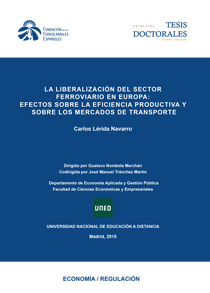
Categories
Publications
Railway sector liberalisation in Europe: effects on productive efficiency and on transport markets

The regulation of the railway sector proposes its liberalisation announcing a positive direct effect on its efficiency. However, the economic literature has not been able to find conclusive empirical evidence that supports this effect, showing deficiencies in the liberalisation variable (assimilated to system organisation).
The justification of this thesis is based on offering an answer in the form of empirical evidence to the question about the effects that the different degrees of liberalisation measured from a quantitative variable can have on the levels of productive efficiency of European railway transport systems.
The main research hypothesis assumes that only with the overcoming of the limitations involved in the introduction in the model of a proxy dichotomous variable of the liberalisation of the railway sector in each country it is possible to contrast the assumption of the European Community regulations that liberalisation by itself will enable those systems adopting it to reach higher stages of productive efficiency.
As far as the descriptive part is concerned, on the one hand it is worth noting the thorough revision of the literature about the estimation of the efficiency in network sectors, with particular emphasis on the transport sector and the rail mode; and on the other hand the compared analysis of the researched European systems and others in the world.
In the applied part, on the one hand there is the development of a Generalised Cost innovative model in order to identify the determinants of the very low modal share related to rail freight transport in Spain (Chapter II). On the other hand, the estimation of efficiency indicators applying parametric (SFA and DFA) and non-parametric (DEA and its programming variant) techniques to a model based on UIC data (2002-2011), following contrast of the required homogeneity of the researched systems (Chapter III). Finally, also included is the quantitative study of the relationship between the variables efficiency and liberalisation, providing empirical confirmation that a specific organisational model associated with certain levels of efficiency does not exist. However, applied statistical tests do show the existence of enough empirical evidence to acknowledge a weak positive association between productive efficiency and liberalisation which is not applicable to all the researched systems (Chapter IV).
In view of the results, the liberalisation of the sector must not be the main objective but a means to reaching higher levels of efficiency which in turn attract increased traffic volumes.
Download book (pdf - free) »


